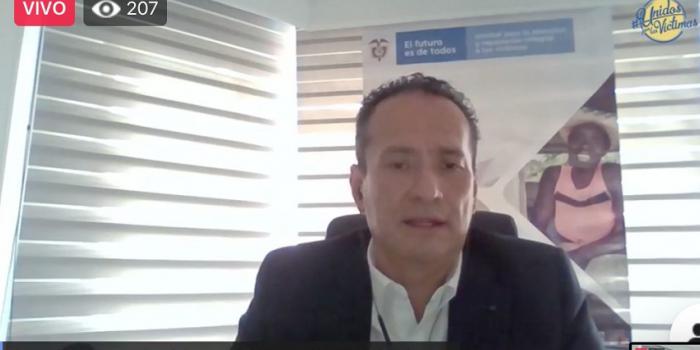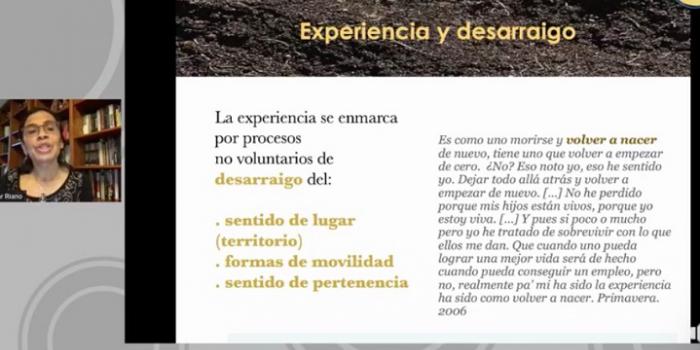
Virtual dialogue examined document on satisfaction of rights of victims abroad
During his speech, the general director of the Unit said that "the most important thing about this event is to be able to make this document known to the victims and show how from the different alliances with international aid workers we can achieve an impact to be able to attend to the national victims".


The presentation of the conclusions of the document Law 1448 of 2011: views on the satisfaction of the rights of victims abroad, a document prepared by the Victims Unit and the organization Norwegian Refugee Council, was successfully carried out.
The event was installed by the general director of the Victims Unit, Ramón Rodríguez, by the head of operations of the Norwegian Council for Refugees, Luz Yadira Galeano, and by one of the victims' representatives abroad before the National Committee on Effective Participation of Victims, Norela Coronado.
During his speech, Ramón Rodríguez said that "the most important thing about this event is to be able to make this document known to the victims and show how from the different alliances with international aid workers we can achieve an impact to be able to attend to the national victims".
For her part, Luz Yadira Galeano assured that "I want to emphasize that this joint effort with the Victims Unit is the result of our direct work with the victim population abroad in recent years and therefore seeks to represent the voice of those people who are often not heard”.
While Norela Coronado, highlighted the importance of the document and asked "to resume the project of the board for victims abroad and that on the page of each consulate there is a space for dialogue with the two representatives before the national board".
The presentation of the document was in charge of Óscar Rico, coordinator of the Group of Attention to Victims Abroad of the Victims Unit, who stated that "the idea was to construct an objective document that reflects different perspectives and technical elements and data quantitative and qualitative that seek to show what has been the implementation of the public policy of victims abroad”.
Pilar Riaño-Alcalá, professor living in Canada, addressed the topic "Exile and forced migration: particularities and implications regarding the reparation and recognition of victims abroad", exposing five factors that this Colombian population abroad faces: the nature of forced migration, experience and uprooting, fear and the crisis of trust, the crossing of borders and factors of gender, race, sexual identity and age, among others”.
During the panel "Scope, challenges and opportunities for improvement in the implementation of the public policy of victims for the satisfaction of the rights of victims abroad", participated Verónica Jaramillo, member of the Collective of Colombian Migrants and Exiles. for Peace (MECOPA) and the Network of Colombian Victims for Peace in Latin America REVICPAZ-LAC (Argentina); Gladys Ávila, victim in exile (Sweden); Lorena Mesa, deputy director general of the Victims Unit; Ambassador Rafael Arismendy, coordinator of the Internal Working Group for Assistance to Nationals - Foreign Ministry (Colombia), and Elena Ambrosi, delegate attorney for the Follow-up to the Peace Agreement. Ángela Iranzo Dosdad, professor-researcher of international relations in Spain, was the moderator.
When the panelists were consulted about the challenges of caring for victims abroad, Lorena Mesa said that “for the Unit the difficult thing has been the issues of registration and declarations, that is how in 2012 we had only 43 declarations, but at the date, there are a little more than 27.000 [victims included in the Sole Registry of Victims]”. Rafael Arismendy, for his part, explained that one of the main challenges has been to ensure that from consular representations it is possible to reach all the places where the victims are, pointing out that the pandemic has represented an additional challenge to “reach people in vulnerable situations”; Elena Ambrosi, an official of the attorney general's office, said that the task of that entity is to follow up and accompany the victims to guarantee their rights "and in that sense we have had a difficulty related to the absence of indicators that show how the care to the victims is progressing. For her part, Gladys Ávila stated that the greatest challenge "is the recognition of the legal nature of both the crime and the victimizing act [cross-border forced migration] and that this crime [forced displacement] be recognized outside Colombian borders", an issue in which coincided with Verónica Jaramillo who assured that "If there is no recognition we do not exist for the institutionality".
By way of closing the panel and envisioning actions to follow in the face of the identified challenges, the moderator, Ángela Iranzo Dosdad, highlighted the importance of national and transnational articulation, and of the participation of various sectors and actors (such as academia and non-governmental organizations) to contribute to various issues identified around social dialogue, recognition of victims abroad, understanding of the situations faced by victims and other actions related to the implementation of public policy.
The conclusions of the meeting were in charge of Óscar Rico, coordinator of the Group of Attention to Victims Abroad of the Victims Unit, who highlighted as fundamental issues for the satisfaction of the rights of victims abroad, to continue advancing towards the recognition of what has been cross-border forced migration, strengthen the various forms of participation of victims abroad in public policy and in projects and initiatives focused on addressing needs or affectations, the importance of creating intersectoral alliances and managing with actors in host countries in search of greater satisfaction of socio-economic and cultural rights, among others. The official added that all of the above is part of peacebuilding and guarantees of non-repetition.
(End/CMC/LMY)






